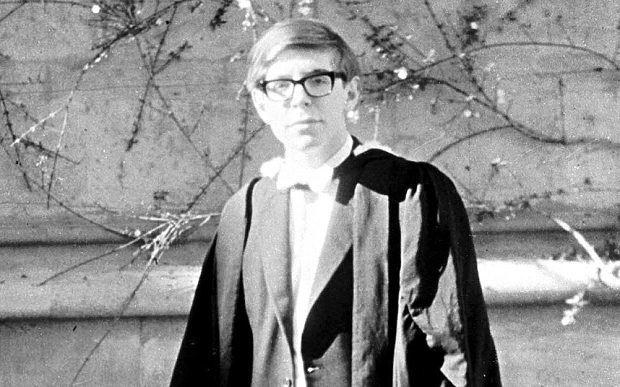With a heavy workload, financial stress, and balancing a social life, college can at times seem like a drag. Is the stress and hard work of all of this in college really worth the piece of paper at the end of these four or possibly six or eight years of toil? Just as millions of college students have experienced, renowned physicist Stephen Hawking also struggled to find meaning in his education. It is hard to believe that someone that is largely considered one of the greatest thinkers of modern times could possibly think this of his college years. When your life is put on a timer, school is the last of your priorities.

At only seventeen years old, Stephen Hawking entered the prestigious Oxford University and wanted to study physics and math, but to keep his father happy he ended up studying physics with chemistry rather than mathematics. During his first year, Hawking battled with feelings of isolation, as he did not make many friends, as his classmates were much older than he was.1 He thrived but was not very happy most of the time he was there. Loneliness is a very common thing for college students to go through, as for many, it is the first time away from home. Frankly, adjusting can be difficult, but more so at such a competitive school like Oxford.
However, things began to look up for the future scientist as, during his last year an an undergraduate, he joined the rowing club and went to parties with this friends.2 With his undergraduate degree in the books, Hawking turned his focus on cosmology, a sub-section of astronomy that is dedicated to discovering the origins of our universe. When he began his graduate career in the mid-sixties, Hawking slowly began to lose control of his body. For some reason, he was getting clumsier and clumsier, and fell for no reason at all.3
After a visit with a specialist, Hawking was diagnosed with amyotrophic lateral sclerosis, otherwise known as ALS or Lou Gehrig’s disease. The disease slowly breaks down the tissue in the nervous system that affects movement.4 While brain function was not affected at all, Hawking slowly but surely would lose control of his body until he died. After his diagnosis, he was only given two-and-a-half years to live.5 His new-found academic happiness was short-lived as he was now living only to die. His years as an undergraduate were now seemingly wasted, as he could not finish his PhD at his new school Cambridge in the limited amount of time he had left.

While initially depressed, a series of events led Hawking to use his limited time wisely. First, while in the hospital, he saw a young boy across from him die from leukemia, which made him realize that while he may have it bad, others have it a lot worse.6 Secondly, he had a dream that he was going to be executed, and he came to the realization that, while he was initially bored with life, there was still a lot left that he wanted to do.7 Lastly and most importantly, he became engaged to his first wife, Jane Wilde. Reflecting back on her significance, Hawking said, “the engagement changed my life. It gave me something to live for. It made me determined to live. Without the help that Jane has given I would not have been able to carry on, nor would I have had the will to do so.”8 Cambridge wanted to help Hawking continue his work, and while they could not make the exception of letting him get his PhD early, they helped in the quality of his life by helping him find closer housing, since Hawking could no longer walk far.9
His disease developed much slower than expected, and with everything falling into place for Hawking, he began making his landmark discoveries in the fields of cosmology and astrophysics. He suggested that the universe must start at a singularity (a point in time where the matter in the universe is infinitely dense) and from then on explodes with a “big bang.”10 Backed by Einstein’s theory of general relativity, it was very difficult to argue with the math behind the landmark theory.

A major part of Hawking’s life was that he wanted to make physics accessible to the everyday person. With this in mind, he wrote books such A Brief History of Time and Black Holes and Baby Universes, as well as help write and produce science movies such as The Theory of Everything. He also refused to let his disability stop him from doing whatever he tried, and to live as normal a life as possible, and take as many opportunities as he could.11 Sadly, we lost a great mind as he passed away on March 14, 2018, which just so happened to coincide with Einstein’s birthday. Hawking defied odds throughout his career as he outlived his initial “death sentence” by more than fifty years. While he can no longer provide further discoveries, he has brought inspiration to a new generation of physicists. Many look up to Newton and Einstein and say they want to be like them, but now many look up to Hawking and say the same.
- Major 21st-Century Writers, 2005, s.v. “Hawking, Stephen W(illiams) (1942-).” ↵
- Major 21st-Century Writers, 2005, s.v. “Hawking, Stephen W(illiams) (1942-).” ↵
- Major 21st-Century Writers, 2005, s.v. “Hawking, Stephen W(illiams) (1942-).” ↵
- L. Fleming Fallon Jr, An Overview of Lou Gehrig’s Disease (ALS), in Lou Gehrig’s Disease, edited by Sylvian Engdahl (Detroit: Greenhaven Press, 2012), 16-24. ↵
- Major 21st-Century Writers, 2005, s.v. “Hawking, Stephen W(illiams) (1942-).” ↵
- Stephen Hawking, A World Famous Scientist Tells about His Life With ALS, in Lou Gehrig’s Disease (Detroit: Greenhaven Press, 2012), 101. ↵
- Stephen Hawking, A World Famous Scientist Tells about His Life With ALS, in Lou Gehrig’s Disease (Detroit: Greenhaven Press, 2012), 101. ↵
- Major 21st-Century Writers, 2005, s.v. “Hawking, Stephen W(illiams) (1942-).” ↵
- Stephen Hawking, A World Famous Scientist Tells about His Life With ALS, in Lou Gehrig’s Disease (Detroit: Greenhaven Press, 2012), 103. ↵
- UXL Encyclopedia of World Biography, 2003, s.v. “Hawking, Stephen,” by Laura B. Tyle. ↵
- Stephen Hawking, A World Famous Scientist Tells about His Life With ALS, in Lou Gehrig’s Disease (Detroit: Greenhaven Press, 2012), 100. ↵



63 comments
Alexandra Lopez
Reading this article informed me about the personal aspects of Hawking’s life that I had not known about. Many who look up to great minds seem to forget that they were once young adults who experienced what we (students) experience as well. The author of this article took a great perspective on the life of Hawking’s life and career making him relatable yet undeniably a fighter for his life. (reposted)
Esperanza Rojas
This was a very touching article. It is crazy how those three encounters, one with the boy, his dream, and his engagement changed his life entirely. Him and first wife were so inspiring to read about. I saw the movie “The Theory of Everything” and it was inspiring to watch the struggles he went through but make something out of himself anyway.
Luisa Ortiz
Before reading your article I had no idea that Steven Hawking was not born tide up to a chair. I think I been living under a rock all this time! His story is very empowering, knowing that he had not an easy life but he overcomes his obstacles and lived his life to its fullest! Articles like this remain why pursuing my degree and to keep pushing on!
Maisie Favila
Stephen Hawking is definitely on my list of favorite people. I enjoyed watching documentaries about him, along with films and books. His story is amazing and it never gets old hearing about it. He had such a great mind and he had so much knowledge it was almost scary. He outlived the date the doctors gave him while also continuing to spread constant findings for people. Overall, this article was well written and very informative.
Luis Magana
What an admirable and magnificent person Stephen Hawking was. He was able to obtain and do so much even though he had many disabilities. I don’t know he how he had a will to live having to face so many obstacles everyday, but he did which is not the mentality not a lot of people would have. He was so successful and had an amazing mind filled with knowledge.
Lilliana Canales
It was a shock to read that Stephen Hawking questioned whether education was of importance or not. I also didn’t know that he was given two years to live when diagnosed with his condition, however he did live longer than expected and gave the world amazing theories and even after his death, his theories are still being looked into.
Jabnel Ibarra
To say Stephen Hawking was an incredible person would be a gross understatement. Not only did he live for decades longer than doctors believed he would, he continued to provide so much to the scientific community as his conditioned worsened and even worked to make science more accessible to the community.
Donte Joseph
Truthfully, I did not know anything about Stephen Hawking but I am always glad to learn more about what I did not know prior. Reading that Stephen Hawking did not let his illness define who he was as a person is not only inspiring, but it is amazing. From starting as nothing to something is a true underdog story and one that everyone should learn to appreciate.
Avery Looney
I know who Stephen Hawking is, but I didn’t know much about his background. It’s crazy to think that one of the smartest minds of the modern day struggled throughout his college years. Hawking’s story is a miracle. He outlived his death sentence by over fifty years and was able to overcome all odds. Hawking did not let his disease get the best of him. He continued to pursue his passion and because of it he has become known as one of the most brilliant minds ever.
Michael Hinojosa
Stephen Hawking was truly one of the worlds greatest scientific minds. A man who despite being disabled continued to pursue his passions speaks volumes of who he was as a person. Though I’m sad to say I never knew anything about him until reading this article and its interesting to see how he handled his life given his condition and how he was able to continue to rise to greatness despite all of the challenges he faced.